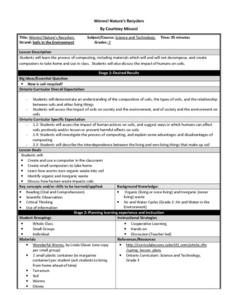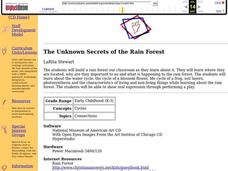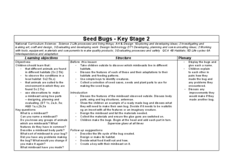Curated OER
A Prickle of Hedgehogs
Students, individually or in groups, conduct research to find information needed to complete a worksheet in which they must match an animal name with 1) the name of its offspring (dog-puppy) and 2) its animal group name (geese-gaggle.)
Curated OER
Comparing Mitosis with Meiosis
Life science learners view an online animated mini textbook comparing two types of cell division. Working in groups, they use a digital microscope to capture images of cells in different stages of mitosis and meiosis. Then they create an...
Curated OER
Worms, Nature's Recyclers!
Learners study what worms need to survive in different environments. They study how worm composting improves soil and reduce waste. They discuss composting techniques and present a puppet show about a worm's life.
Curated OER
Dinosaurs
Students are introduced to the various types of dinosaurs and write in their journals about their favorite one. After listening to a story and watching a filmstrip, they color a few pages in their Dinosaur Friends Book. They also examine...
Curated OER
The Unknown Secrets of the Rain Forest
Young scholars listen to the story "The Great Kapok" then discuss characteristics of the rain forest. They make several different types of rain forest animals from paper plates (ex. sloth, tigers, monkeys etc) and design costumes for a...
Curated OER
Seed Bugs; Stage 2
Students examine nature by participating in an environmental art activity. In this imaginary creature lesson, students discuss the importance of a habitat when pertaining to wild animals or bugs. Students utilize tree parts which they...
Chicago Botanic Garden
Seasons of a Plant
The third in a series of six lessons is an engaging three-part activity defines that discusses phenology, focusing on the cyclic seasons of plants. Pupils then observe phenology outside before determining how climate change can...
Curated OER
WET Science Lesson #11: How Light Affects Water
Scientists listen to the story of Wadja Egnankou who works to save African mangrove forests. They experiment with refraction and the introduction of particulate matter to water. They conclude with creative writing about the need for a...
Curated OER
This Is Tree-rific!
Third graders view a clip of the video Backyard Safari, "Trees," and portray the life cycle of a tree. They also view a clip on structures of a tree and draw a diagram of a tree in their science journals.
Curated OER
Household Pests
Sixth graders discover the various habitat requirements for assorted household pests from ants to wasps. They conduct various activities including researching the life cycles moths, cockroaches, and mosquitoes
Curated OER
Photomosaic Pixel Composite
Students research the habitat, diet, life cycle, and characteristics of an animal, and create a Japanese scroll painting of their animal. Using scanned images of animals they have painted, they create a composite mosaic using PowerPoint.
Curated OER
Critters of the Water
Students examine different organisms in various marine habitats. They identify any adaptations that have allowed the organisms to survive. They develop an imaginary organism and describe its life cycle.
Curated OER
Creating a Food Web
Students investigate hunters and prey by creating a food web. In this animal life lesson, students investigate a single organism in preparation for a field trip, discovering its diet and habitat. Students each discuss their...
Curated OER
Hide In Plain Sight
Students view video clips and use the Internet to look for hidden animals. They then use the Internet to print out animal shapes and color them. They create environments on construction paper in which their animals can hide.
Curated OER
Hawaii's Freshwater Animals - Species Report
Students explore biology by creating a report for the class. In this oceanography lesson, students research and identify the survival characteristics of a list of freshwater animals by utilizing the Internet and library. Students...
Curated OER
Niches and Adaptations
Students present information about a species, its niche, and adaptations. In this lesson on animal environments, students explore how surroundings can affect a given population resulting in adaptation.
Curated OER
Hare and Lynx Population
Fourth graders study changes in animal population. In this graphing lesson, 4th graders create graphs from information read to them about hares and lynx populations. They will describe patterns of change in the graphs and discuss why...
Curated OER
Get Cracking
Young scholars compare the life cycle of an animal hatched from an egg with one born from its mother's womb. The lesson focuses on dinosaur eggs. They create dinosaur eggs from balloons and papier mache.
Curated OER
Compost Columns
In this unit of lessons, young scholars examine the role of compost columns and recycling. They create a KWL chart about garbage in Chicago. They also examine life cycles and packaging of everyday products.
Curated OER
Territorial Behavior in Dragonflies and Damselflies
Students explore dragonfiles/damselfiles and their behaviors. They examine their differences and their life cycles. Students observe the dragonflies in a field and determine the number of different species.
Curated OER
Diurnal Cycling Experiments
Students carry out an experiment to monitor diurnal fluctuations in dissolved oxygen, carbon dioxide, pH, and water temperature. They determine the CO2 and pH of the samples (and optionally, dissolved oxygen). Students complete their...
Curated OER
How do plant & animal cells make and use energy?
Students show the relationship between the need for plants to undergo photosynthesis in order to generate oxygen. They see the flaws associated with this thinking because of the lack of CO2 and H2O and lack of sufficient gravity in order...
Curated OER
Fiber of Life
Students examine the importance of plants to individuals and society through a multi-discipline set of activities. They observe and draw different leaf structures and then create a book about trees and photosynthesis. They explore ways...
Rainforest Alliance
Investments in Forest Carbon
One hundred metric tons of CO2 can accumulate in one acre of forest over time—that's a lot of carbon! In the activity, groups of middle school learners determine what makes forests important. They then solidify the concept by using a...
Other popular searches
- Plant Animal Life Cycles
- Sea Animal Life Cycle
- Powerpoint Animal Life Cycle
- Animal Life Cycles Bird
- Animal Life Cycles Units
- Animal Life Cycle Alligator
- Animal Life Cycle Worksheets
- Animal Life Cycle Frog
- Florida Animal Life Cycles
- Reef Animal Life Cycles
- Plant, Animal Life Cycles
- Animal Life Cycle Lark

























